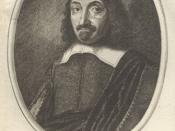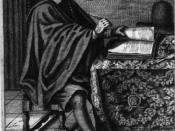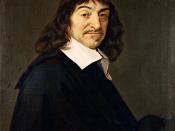Descartes
Many believe that the universe is infinite; others may believe that knowledge is infinite. The simple answer is that no one will ever know. Thankfully, we can form our own opinions and theories by studying famous and intriguing philosophers, such as Rene Descartes. Mankind has, and always will, seek to understand one another and the world around them. Discourse on Method is a work written by Rene Descartes that was published in 1637. In this work, Descartes declares the most famous and most important proposition in the history of modern philosophy. "I think, therefore I am." "These words indicated the comprehension of the existence of the self as a reality beyond doubt, and for that reason Descartes is known as the Father of Modern Philosophy" (Newman). Descartes' work suggests that our senses and perception rely on the mind rather than the body. So if our senses continuously deceive us, how can they be trusted? As stated in Mediations III, "I am a thing that thinks, that is to say, a thing that doubts, affirms, denies, knows a few things, is ignorant of many things, wills, rejects, and also imagines and senses" (Descartes, 23) .
The process of Descartes' approach in his work, Discourse on Method, is to put it simply, If
something can be doubted even a little, it must be completely rejected. In Mediations II, Descartes adds
"I will go forward until I know something certain-or, if nothing else, until I at least know for certain that
nothing is certain," (Descartes, 17). The things one would assume to be automatically correct, must be
completely rejected should there be even the slightest doubt about them. Descartes proclaims that the
"one thing that cannot be excluded and remains last of all is the perception." (Descartes, 30) In
Descartes' wax argument, we find that the wax changes color and smell and melts into liquid when
brought near a flame, but it is still wax. We can rely on our senses to help understand the true nature of
things, but senses alone are not enough to determine the truth because senses are often deceived. So if
our senses continuously deceive us, how can they be trusted? Humans have awareness of form and
shape through their five senses which gives humans perception of the world around them. "It is a fact
that perception can sometimes be subconscious and conscious." (Fields) The solution is that Descartes
found we must rely on our minds to determine what is real.
It seems a very bold point that many try to discredit Descartes on is a very important one. In the
sixth mediation, Descartes claims that "mankind, and all of what we see in the world, is a product of
"intellection". (Descartes, 9) This means that if we saw a table, it is only what the mind tells us to see, a
table. Implying that humans do not have a direct access to reality, and thus, humans will never see
things as they really are but by only what their mind tells him they are. In the sixth mediations,
Descartes goes on to say, "the human mind is shown to be really distinct from the body, and,
nevertheless, to be so closely conjoined therewith, as together to form, as it were, a unity." (Descartes,
10) Descartes points out that the mind and body are separate, thus confirming his beliefs in dualism.
Furthermore, Descartes says, "Since I know that bodies are not, properly speaking, perceived by the
senses or by the faculty of imagination, but only by the intellect, and since, moreover, I know that they
are not perceived by being touched or seen, but only insofar as they are expressly understood, nothing
can be more easily and more evidently perceived by me than my mind." (Descartes, 23) I believe
Descartes is trying to say that the mind has greater value than the senses and the wax argument
demonstrates that thinking with the mind is how we know physical objects exist outside of the mind, if
they can have a real existence.
The wax argument is effective in proving how difficult it is to rely solely upon our senses for an
understanding of the world around us. Everything we thought we knew by using our senses can only be
known by properly utilizing our minds. However, humans can use their senses to help understand the
nature of things, the senses alone are not enough to determine the truth. The mind is the only reliable
authority in determining what is true and real. Everything we know to be true, is known by our thinking,
understanding and judgment. So do one's senses and perception rely on the mind rather than the body?
Well considering the example stated in out Descartes notes on angel, "When you think of moving your
arm, your arm moves. On the other side of the coin, when you touch something with your arm, your
mind experiences the sensation. This view of the mind body relation is known as Cartesian
interactionism." (Descartes notes) Through Cartesian interactionism, the mind and body, though
separate and distinct substances, casually interact. An arm moving across an object sends feelings of
sensations to our mind. In conclusion, it seems more appropriate that the statement be changed to: our
senses and perceptions rely on our mind in addition to our bodies, instead of rather.
Works Cited
Descartes, ReneÃÂ, and Donald Cress. Discourse on Method and Meditations on First Philosophy. 4th ed. Vol. 1. Cambridge: Hackett, 1999. Print.
Fields, Douglas. "The Subconscious Mind and Extrasensory Perception." BrainFacts Blog. N.p., 10 Dec. 2012. Web. 24 Apr. 2014.
Newman, Lex. "Descartes' Epistemology." Stanford University. Stanford University, 03 Dec. 1997. Web. 24 Apr. 2014.
Descartes notes on Angel, PHI2010 (76)


